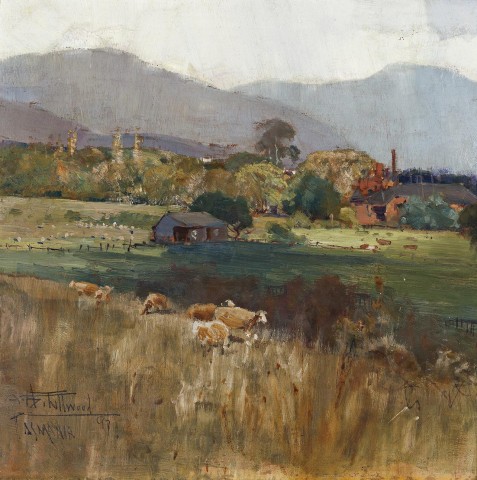NEW TOWN, TASMANIA, 1897
ALBERT HENRY FULLWOOD
oil on wood panel
26.0 x 26.5 cm
signed, dated, and inscribed lower left: A.H. Fullwood / TASMANIA 97
Private collection
Sotheby’s, Melbourne, 21 April 1986, lot 20 (as ‘Rural Tasmania’)
Private collection, Sydney
Sotheby’s Australia, Sydney, 21 July 2015, lot 110 (as ‘Tasmania’)
Private collection, Hobart
Collector’s Exhibition 2016, Lauraine Diggins Fine Art, Melbourne, 6 August – 29 October 2016 (as ‘(The Rivulet at New Farm with Mezger’s Mill)’)
Albert Henry Fullwood made a series of visits to Tasmania during the 1890s and on his first trip in 1893, toured the Derwent Valley, where he produced a number of watercolour sketches which were subsequently lent to the Tasmanian Art Gallery in Hobart. The Art Society of Tasmania, who at the time was extremely active in promoting Tasmania’s role in the arts in Australia, seized the opportunity to engage him as a teacher of landscape painting.1 Later in the year, Society founder Louisa Swan visited Sydney to cultivate a relationship with the New South Wales Art Society. On her return to Hobart, she noted that among Fullwood's exhibits at the New South Wales Art Society exhibition were several Tasmanian subjects.2 Among these was Hop Pickers, New Norfolk, Tasmania, 1893, now in the collection of the Tasmanian Museum and Art Gallery.
Fullwood played an active role in the arts in Tasmania for the rest of the decade. In 1894 he exhibited at the Tasmanian International Exhibition and in 1897 he again visited Hobart. During an interview on ‘The Impressionist School of Painting’ published by the Mercury newspaper that year he was described as being ‘busy with his brush and with teaching’.3 His art classes were advertised prior to his arrival in Hobart, with students asked to send their names to Louisa Swan for enrolment.4
The site chosen for these lessons was the rustic property of New Farm, in the then rural region of New Town. The area had been developed in the early days of the colony by former convict George Gatehouse, and in 1848 was sold to John Mezger, who operated a bone mill on the site.5 By the 1890s, the mill was already in a dilapidated state, however the ruins of Mezger's Mill proved a favourite subject, and paintings remain by both Fullwood and Swan.6 In this picturesque view dating from 1897, Fullwood depicts the site from further afield, with the agricultural complex partly obscured by the willows growing along the New Town Rivulet.
The mill and its surroundings consequently became popular subject matter for both local and visiting painters, and were depicted by a range of notable artists, including Frederick McCubbin, who produced several views including Mezger’s Mill, near Hobart, Tasmania (National Gallery of Victoria, Melbourne) when visiting the colony in 1899. Later correspondence between McCubbin and Tom Roberts suggests that it was Fullwood, in Hobart again at that time, who introduced him to the site.7 Today, while the core of the property remains intact and surrounded by trees, the outlying land has been engulfed by the suburbs of New Town and Moonah.
1. ‘Epitome of News: The Tasmanian Art Gallery’, The Mercury, Hobart, 27 April 1893, p. 2
2. ‘Progress of Art in Tasmania: The Art Society’s Exhibition’, The Mercury, Hobart, 16 October 1893, p. 4
3. ‘The Impressionist School of Painting: Interview with Mr. A. H. Fullwood’, The Mercury, Hobart, 3 April 1897, p. 1
4. ‘Epitome of News: Mr. Fullwood’s Art Classes’, The Mercury, Hobart, 18 February 1897, p. 2
5. MacKenzie, A (1990), Frederick McCubbin 1855-1917: ‘The Proff’ and his art, Mannagum Press, Melbourne”, p. 98
6. Gray, A, ‘Fullwood in Tasmania’, The Art Bulletin of Tasmania, Hobart, 1984, p. 52
7. ibid. p. 98
PAUL O’DONNELL
